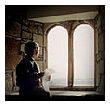Mothers as Bridge Builders
Posted by Anne on May 9, 2020 in Writing | 2 commentsLeah was the older sister of Rachel and daughter of Laban. Rachel was so lovely to look at that Jacob was smitten at first glance and fell so head-over-heels he was willing to work for seven years to have her as his wife. However, Laban tricked him into marrying Leah first—and perhaps Jacob never forgave her for her part in the deception. Certainly she spent years striving to gain a small share in his affection, hoping that the children she was bearing would gain her some fondness in his eyes.
How many women have been like her across the ages, thinking that their marriages will change for the better when children come along?
Leah never seemed to get any emotional traction with Jacob; even her children were discounted. Jacob made this remarkable statement revealing his inner attitude towards them:
‘My son will not go down with you. His brother Joseph is dead, and he is all I have left. If anything should happen to him on your journey, you would send this grieving, white-haired man to his grave.’
Genesis 42:38 NLT
When he said, ‘my son… all I have left…’ he was referring to Benjamin. It’s as if he has no children other than the sons of Rachel—Joseph, whom he believed was dead, and Benjamin. The argument which climaxed with this statement was about his second son Simeon who, at this point, was in prison in Egypt. All it would have taken to free him was for Benjamin to show up, but Jacob wouldn’t let it happen. His words and his actions say that Benjamin is precious to him; Simeon is worthless.
Jacob’s favouritism towards Rachel’s children and his almost callous dismissal of Leah’s offspring seem to reflect his attitude towards their mothers. He simply didn’t care for Leah, despite all her efforts to win a crumb of affection from him. It took years for her to realise nothing would change. When she first bore Jacob a son, she was so obviously hopeful. Naming the child Reuben, she said, ‘The Lord has seen my affliction. Surely my husband will love me now.’
Hear the desperate yearning in those words: ‘Surely my husband will love me now.’ But her hopes were dashed. Over the next few years, her optimism rose repeatedly with the birth of each new son, only to be crushed back down.
Again she conceived and gave birth to a son, and she said, ‘Because the Lord has heard that I am unloved, He has given me this son as well.’ So she named him Simeon.
Once again Leah conceived and gave birth to a son, and she said, ‘Now at last my husband will become attached to me, because I have borne him three sons.’ So he was named Levi.
Genesis 29:32–34 BSB
Then, at long last, she realised the truth. Jacob wasn’t going to change. He was so totally besotted with her sister he would never have eyes for anyone else. Leah could have become embittered at this point; she could have taken out her anger and frustration on those around her. She could, like so many of us, have pointed the finger of blame at God and held Him responsible for her anguish.
Instead she does something no one in the Bible is ever recorded as doing previously.
Once more, she conceived and gave birth to a son and said, ‘This time I will praise the Lord.’ So she named him Judah.
Genesis 29:35 BSB
She praised God.
She raised her hands to heaven and gave thanks. Praise is mentioned so often in Scripture it’s easy to overlook its first appearance. It happens when Leah gives birth for a fourth time.
Take particular note of the circumstances: it’s not in celebration of a great victory; not in remembrance of some glorious fulfilment of a promise; not when a cherished dream at last comes true. It’s when a disappointed woman chooses to turn to God in her brokenness and her pain and give thanks anyway.
As she changed direction, she became the navigator and bridge-builder for the future. For it is through the line of Judah that Jesus, the Messiah, would eventually come.
Island calls to island across the silence, and once, in trust, the real words come, a bridge is built and love is done—not sentimental, emotional love, but love that is pontifex, bridge-builder. Love that speaks the holy and healing word which is: God be with you, stranger who are no stranger. I wish you well. The islands become an archipelago, a continent, become a kingdom whose name is the Kingdom of God.
Frederick Buechner, The Hungering Dark
In ancient times, people thought the making of a bridge was such a miraculous skill it must be inspired by the gods. A pontifex—bridge-builder—was almost a sacred title and the greatest were treated as close to divine.
Make no mistake, Leah built a bridge to heaven. Her husband might have had a vision of a ladder with angels ascending and descending on it, but Leah’s expression of faith is no less significant. She may not have known that God inhabits the praises of His people, but her acknowledgement of Him was a gateway into her life and into the situation. Her legacy is that of the first person ever mentioned as praising God—a woman who surrendered her hope of earthly favour and who put on record her thankfulness for heavenly favour.
read more




